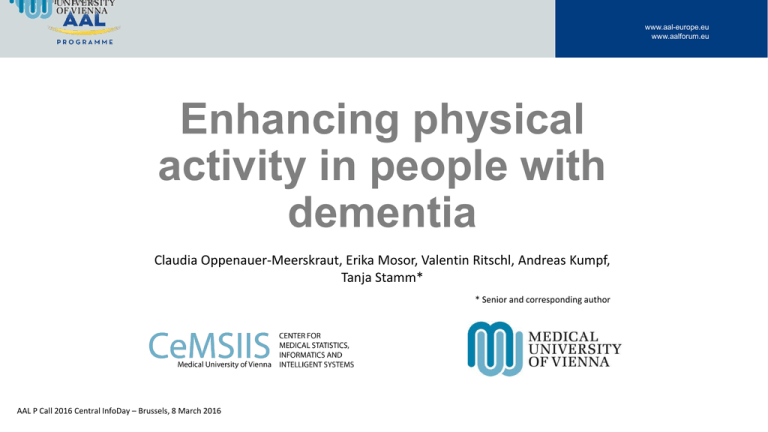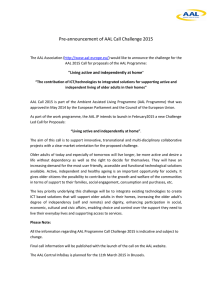Enhancing physical activity in people with dementia
advertisement

www.aal-europe.eu www.aalforum.eu Enhancing physical activity in people with dementia Claudia Oppenauer-Meerskraut, Erika Mosor, Valentin Ritschl, Andreas Kumpf, Tanja Stamm* * Senior and corresponding author AAL P Call 2016 Central InfoDay – Brussels, 8 March 2016 www.aal-europe.eu www.aalforum.eu Who We Are * • We analyse outcome data in health care, develop corresponding instruments, optimize measurement scales and adapt assessments to different contexts. • Outcomes include the measurement of clinical signs and symptoms as well as results of medical interventions, but also quality of life, functioning, pain, fatigue or the impact of exercise-induced dyspnoea in daily life - outcomes which are most important for patients. • The inclusion of the patients’ perspective is essential for outcome measurement. • The Section for Outcomes Research develops methods to measure, analyse and compare outcomes in health care by using complex scores, patient-reported instruments, multivariate models, Rasch analyses, mixed methods, and activity- and motion-analyses. • Data gathering is optimized with sensor technologies and e-health solutions. • Qualitative research methods are developed and applied. AAL P Call 2016 Central InfoDay – Brussels, 08 March 2016 *Stamm et al. Reasoning behind non-standardised and standardised assessments that occupational therapists use when working with people who have a musculoskeletal impairment. In: Curtin & Adams (2016). Musculoskeletal occupational therapy , Elsevier www.aal-europe.eu www.aalforum.eu Project idea Status quo • Dementia leads to severe impairments in independence, mobility and quality of life. • Physical activity and mobility are health promoting factors in older adults in general and more specifically in people with dementia. • People with dementia hardly benefit from social and technological innovations. However, social and technological innovations, including AAL technologies, could potentially enhance physical activity, as well as in- and outdoor-mobility and quality of life of people with dementia. • Trials with large sample sizes on the effect on AAL technologies are currently lacking. Project aims • According to users’ needs and already existing applications an AAL solution for people with dementia will be developed in order to increase physical activity and in- and outdoor mobility. • Investigation of motivational models to increase users' motivation to be physically active. • The AAL solution will be able to interact with the user (e.g. Avatar) and will be voice controlled to increase usability and feeling of interaction. • Multi-center trial with a large sample size to generate evidence for AAL technologies in dementia will be performed. AAL P Call 2016 Central InfoDay – Brussels, 08 March 2016 www.aal-europe.eu www.aalforum.eu We need • (a) technical partners for the development of the training application prototype • a design partner for a highly aesthetic and intuitive interface • a technical partner with expertise in voice controlled interaction • a partner with expertise in Avatar-based user interaction • clinical partners in other countries for a multi-center trial with a large sample size to generate evidence for AAL technologies in dementia We offer • Expertise in patient-oriented outcomes measures • Expertise in development and evaluation of AAL technologies • Expertise in the management of international multi-center clinical trials • Multidisciplinary team of psychologists, physicians, physiotherapists, occupational therapists, health researchers, methodologists, etc. with special knowledge in gerontology • Excellent publication skills • Excellent contacts to international scientific (Vienna, Leiden, London, Timisoara) and technical partners, user organisations and test regions to guarantee user involvement AAL P Call 2016 Central InfoDay – Brussels, 08 March 2016 Looking for

